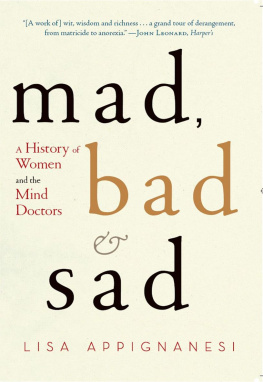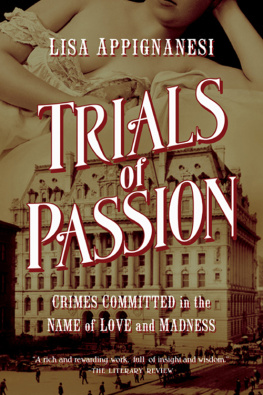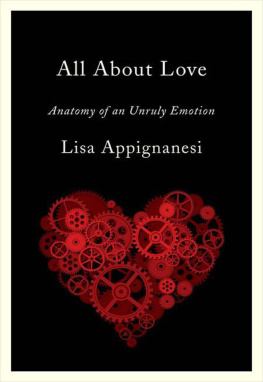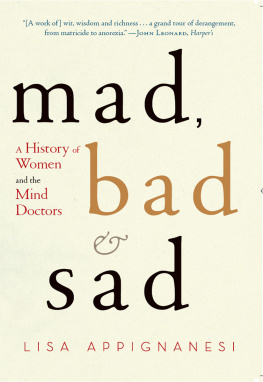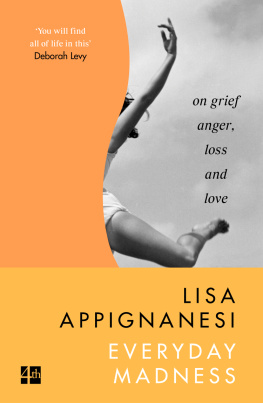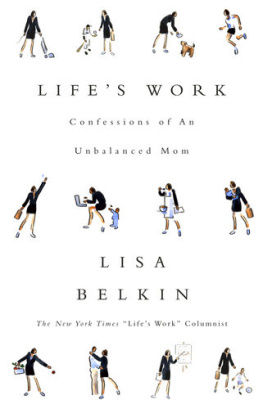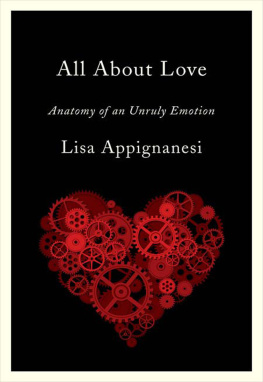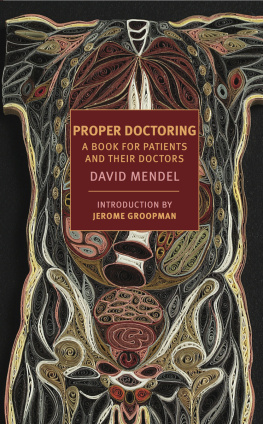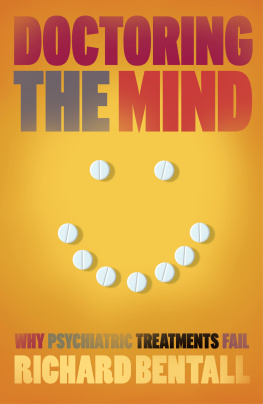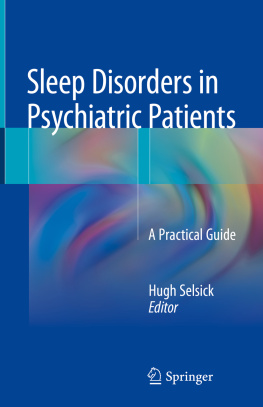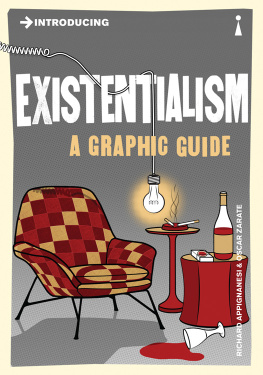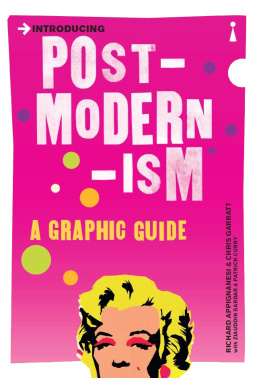LISA APPIGNANESI

W. W. N ORTON & C OMPANY
New York London
Copyright 2008, 2007 by Lisa Appignanesi
First published in Canada in 2007 under the title
Sad, Mad, and Bad: Women and the Mind-Doctors from 1800
First published in Great Britain in 2008 under the title Mad, Bad, and Sad:
A History of Women and the Mind Doctors from 1800 to the Present
All rights reserved
For information about permission to reproduce selections from this book, write to Permissions, W. W. Norton & Company, Inc., 500 Fifth Avenue, New York, NY 10110
Library of Congress Cataloging-in-Publication Data
Appignanesi, Lisa.
[Sad, mad, and bad]
Mad, bad and sad: women and the mind doctors/Lisa Appignanesi.
1st American ed.
p. cm.
Originally published: Sad, mad, and bad: women and the mind-doctors from 1800. Canada, 2007.
Includes bibliographical references.
ISBN: 978-0-393-06994-5
1. WomenMental healthHistory. 2. WomenMental health servicesHistory. 3. Mentally ill womenRehabilitationHistory. 4. Mental illnessTreatmentHistory. I. Title.
RC451.4W6 A66 2008
6163.890082dc22
2008001775
W. W. Norton & Company, Inc., 500 Fifth Avenue, New York, N.Y. 10110
www.wwnorton.com
W. W. Norton & Company Ltd., Castle House, 75/76 Wells Street, London W1T 3QT
For Josh Appignanesi and Katrina Forrester
my two glorious children
who drive me mad
and make me sane
CONTENTS
PART ONE
A TIME BEFORE
PART TWO
THE RISE AND RISE OF THE NEW SCIENCE
PART THREE
THE CENTURY TURNS
PART FOUR
INTO THE PRESENT
AUTHORS NOTE
This book owes a great debt to all the researchers, historians, thinkers, doctorsindeed patients, biographers, memoirists, writers and poetswho have ploughed this rich terrain before me. In particular I am grateful to the late, brilliant and indefatigable Roy Porter, who has served as inspiration to so many and who was also a friend. Something of an unattached outsider in the history of psychiatry and psychoanalysis, my debt extends across the divisions in what is nothing if not a contested field. Historians such as Edward Shorter, Andrew Scull, Sander L. Gilman, Richard Hunter and Ida Macalpine have shown the way; but so, too, have Jan Goldstein and Elizabeth Roudinesco in France, Nathan G. Hale, Nancy Tomes, and the anthropologist Tanya Luhrman in America, and Elaine Showalter. Attention needs to be drawn to the maker of one superbly abundant website, Andrew Roberts of Middlesex University.
People have asked me why, after writing fiction, I have chosen to immerse myself in the history of a science and practice which has so many of its own writing professionals.
I could answer that as a writer, I simply have a faith in the outsiders view and have always had a fascination for the vagaries of the human mind. Or, since there are many ways of tracing ones trajectory, I could say that an interest in madness was also a form of survival. My early family lifewhich I evoked in Losing the Dead amongst people chased by the Holocaust to peaceful Canadian shores had its own strangeness, one that was hardly reflected in television sitcoms. Retrospectively, it makes sense that I wrote an MA thesis on Edgar Allan Poe and his hauntings by the dead and undead; and that I worked part-time for a psychoanalytic publishing house in New York. My doctorate, though in literature, already contains some of the strands of this book: how femininity was constructed and understood by the great writers of the turn of the nineteenth century, in particular, Henry James, brother of Alice, who features in these pages; Proust, still the greatest literary psychologist; and Robert Musil, a near-neighbour of Freuds, who also came into that modernist literary picture with its everyday psychopathologies.
Freuds Women is, of course, part of this trajectory, as are several of my novels, from Memory and Desire to Sanctuary and Paris Requiem , where mind doctors somehow seem to intervene to strut their stuff. Finally, my mothers Alzheimers vividly reminded me both how fragile and how extraordinary the human mind is. It sent me on a journey into the harder side of the brain sciences. I spent two years shadowing the world of the Brain and Behaviour Lab of the Open University. Here, neuroscientist Steven Rose led research into memory. I was forced, through what sometimes felt like supervisions, alongside reading and conferences, to confront a biochemical approach to brain and mind. All this is partly reconfigured in my novel The Memory Man . Of course, it also prepared me for the work in these pages.
In a way, Mad, Bad and Sad is a book I have been writing all my life.
Over the years I have had conversations with more mind doctors across the psy fields, patients and clients, than I can name or might wish to be named here; they will find their ideas dotted, transmuted, sometimes argued with, across the coming pages. I also owe a particular debt to Cyril Cannon for a case he pointed me to; to Alison Gardener, Assistant Archivist of the Lothian Health Services Archive, Edinburgh University Library, and Dr Michael Neve of the Department of the History of Medicine at University College London.
I have been honoured by a grant from the Authors Foundation which helped me see my way to the end of this book. I am very grateful to the Foundation and to their awards committee.
I owe particular thanks to my agent, Clare Alexander, who sparked my writing of this book, and my editor at Virago/Little, Brown, Lennie Goodings, two extraordinary women. In America, Angela von der Lippe has been a great help.
The closer to home I get, the greater my debts grow. I could not have written this book without the usefully pedantic vigilance of John Forrester, Professor of History and Philosophy of Science at the University of Cambridge, with whom some years ago, I co-authored Freuds Women. Finally, I thank my children, Josh Appignanesi, who while I was writing this book managed to make an astonishingly fine feature film, and Katrina Forrester, who somehow made her way through Cambridge University. Without their curiosity and energy, little seems worthwhile.
Lisa Appignanesi, January 2007
Much madness is divinest sense
To a discerning eye;
Much sense the starkest madness.
T is the majority
In this, as all, prevails.
Assent, and you are sane;
Demur,youre straightway dangerous,
And handled with a chain.
From Life by Emily Dickinson
INTRODUCTION
The simplest way to begin is to say that this is the story of madness, badness and sadness and the ways in which we have understood them over the last two hundred years. Some of that understanding has to do with how the dividing lines between them were conceived and patrolled, in particular by a growing group of professionals or mind doctors, who came to be known, as the nineteenth century turned into the twentieth, as alienists, psychiatrists, psychologists, psychoanalysts and psychotherapists. They were also sometimes neurologists, pathologists and latterly neuroscientists and psychopharmacologists. All of them thought they were in one way or another illuminating the dark corners of the mind and amassing crucial knowledge. In that sense, and appropriately, they thought of themselves as scientists. They were helped along the way by criminologists, judges, statisticians and epidemiologists. Crucially, they were also helped by patients.

